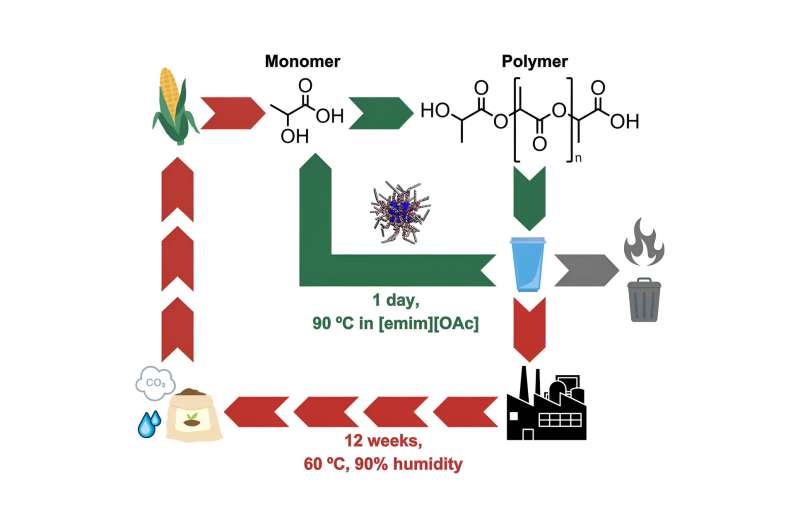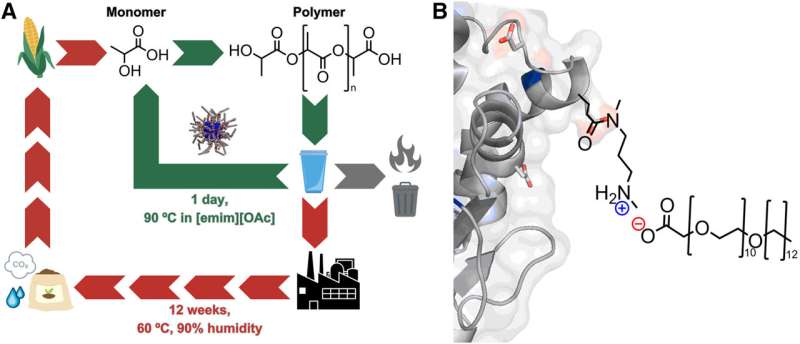This article has been reviewed according to Science X's editorial process and policies. Editors have highlighted the following attributes while ensuring the content's credibility:
fact-checked
peer-reviewed publication
trusted source
proofread
An enzyme used in laundry detergent can recycle single-use plastics within 24 hours

Scientists at King's College London have developed an innovative solution for recycling single-use bioplastics commonly used in disposable items such as coffee cups and food containers.
The novel method of chemical recycling, published in Cell Reports Physical Science, uses enzymes typically found in biological laundry detergents to "depolymerize"—or break down—landfill-bound bioplastics. Rapidly converting the items into soluble fragments within just 24 hours, the process achieves full degradation of the bioplastic polylactic acid (PLA). The approach is 84 times faster than the 12-week-long industrial composting process used for recycling bioplastic materials.
This discovery offers a widespread recycling solution for single-use PLA plastics, as the team of chemists at King's found that in a further 24 hours at a temperature of 90°C, the bioplastics break down into their chemical building blocks. Once converted into monomers—single molecules—the materials can be turned into equally high-quality plastic for multiple reuse.
The problem with 'green' plastics
Current rates of plastic production outstrip our ability to dispose of it sustainably. According to Environmental Action, it is estimated that in 2023 alone more than 68 million tons of plastic globally ended up in natural environments due to the imbalance between the huge volumes of plastics produced and our current capacity to manage and recycle plastic at the end of its life. A recent OECD report predicted that the amount of plastic waste produced worldwide is on track to almost triple by 2060, with around half ending up in landfill and less than a fifth recycled.
While bioplastics—derived from biological sources such as corn starch, cassava or sugarcane—are seen as a more sustainable choice by consumers, current methods of bioplastics production are costly and compete with food-based agriculture for use of land. Meanwhile, mechanical recycling methods are inefficient, generate CO2 and are incapable of producing high-quality reusable materials. These "green" plastics primarily end up in landfill after just one use, causing many retailers to revert to using oil and fossil-based materials.
The speed at which the bioplastics break down using this new method could revolutionize plastic production, offering an efficient, scalable and sustainable blueprint for recycling single-use bioplastics. A significant breakthrough in the recyclability of single-use bioplastics, the research opens up the opportunity for a sustainable, circular economy that stamps out the production of fossil-based plastics and tackles the huge volume of plastic waste that ends up in landfill and natural environments.
Dr. Alex Brogan, Lecturer in Chemistry at King's College London, said, "The inspiration for this project came from a problem with bioplastics used in medical and surgical products degrading in the body. We've turned this problem around and applied it to the issue of recycling the single-use bioplastics we use in our everyday lives using a common enzyme found in biological laundry detergent. Being able to harness biology to deliver sustainable solutions through chemistry allows us to start thinking of waste as a resource so that we can move away from oil and other non-renewable sources to create the materials we need for modern life."

The scientists are now extending their research into improving the recycling of other commonly used and mass-produced plastics, such as those used in single-use water bottles, film and sheet plastic packaging, and clothing.
Susana Meza Huaman, Ph.D. researcher on the project at King's College London, said, "Our research marks the first step in developing new technologies in waste management for recycling bioplastics that are of equal quality to the virgin product. Until now this has been a major challenge in plastics recycling, as while bioplastics are made of biological materials, they are not all compostable and most current recycling methods are inefficient. Our chemical approach significantly speeds up the degradation of bioplastics, enabling them to be recycled and reused."
More information: Susana M. Meza Huaman et al, A general route to retooling hydrolytic enzymes toward plastic degradation, Cell Reports Physical Science (2024). DOI: 10.1016/j.xcrp.2024.101783
Journal information: Cell Reports Physical Science
Provided by King's College London





















